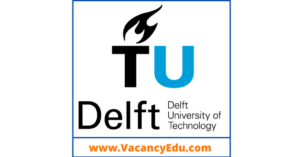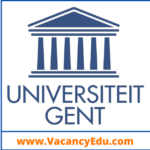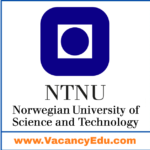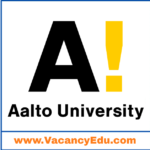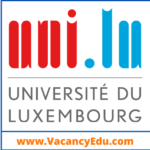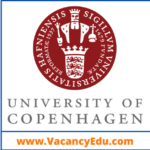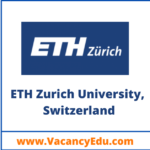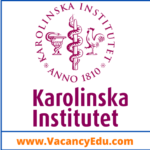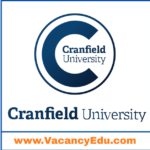Delft University of Technology (TU Delft), Netherlands invites online Application for number of Fully Funded PhD Degree at various Departments. We are providing a list of Fully Funded PhD Programs available at Delft University of Technology (TU Delft), Netherlands.
Eligible candidate may Apply as soon as possible.
(01) PhD Degree – Fully Funded
PhD position summary/title: PhD Position Medical Physics- Medical Informatics
Medical Physics and Medical Informatics have been evolved to vital sections of health technology, contributing to both diagnostics and therapeutics. Therapeutic applications of radiation are continuously evolving, incorporating innovative techniques for optimization. Radionuclide therapy is a technique designed to target cancerous cells while minimizing radiation exposure to healthy tissues. During radionuclide therapy radioactive pharmateuticals are injected into the body and emit low-ranged ionizing particles. Consequently, dosimetric studies must explore how radiation interacts with living cells and their DNA.
To this end, Monte Carlo simulations (MCs) can enhance our understanding of cellular damage caused by ionizing particles such as alpha and beta. MCs represent the state-of-the-art approach for dosimetric and micro-dosimetric investigations. However, MCs are computationally intensive and require optimization to be effectively integrated into clinical practice. Artificial Intelligence (AI) methods have long been employed as tools to assist with medical diagnosis and inverse planning in radiation therapy.
The recruited PhD candidate will investigate radiobiological damage induced by ionising particles, emitted by various radionuclides (Ac-225, Pb-212, Lu-177, Ho-166 and similar), using MCs. The candidate will also implement Generative Adversarial Networks (GANs) and/or Diffusion Models to optimize the estimation of energy deposition, the difusion of chemical reactant induced by radiolysis, and the calculation of DNA damage. These advancements will facilitate the optimization of radionuclide therapy by integrating computational techniques for real-time cellular damage estimation.
Deadline : 31 Jul 2025
(02) PhD Degree – Fully Funded
PhD position summary/title: PhD Position Computational Modeling and In Silico Design of Dynamic Hydrogenation Catalysis
We are looking for a motivated PhD candidate with a strong background in chemistry and a keen interest in computational chemistry and catalysis to join the NWO VICI-funded project DYNACAT in the ISE group by prof. dr. Evgeny Pidko, which aims to uncover new principles for improving the durability and efficiency of earth-abundant molecular hydrogenation catalysts. In this position, you will develop a next-generation high-throughput testing platform to combine and automate kinetic and spectroscopic analysis of catalytic reactions under realistic conditions. The position will contribute to the development of operando computational models and automated in silico screening tools that account for catalyst dynamics, deactivation pathways, and condition-dependent reactivity. The candidate will work with advanced quantum chemical methods and/or machine learning techniques to understand catalyst stability and reactivity, explore reaction networks, and construct computational workflows to guide the design of new catalytic systems.
We offer
- A highly interdisciplinary and collaborative research environment
- Access to cutting edge computational tools and supercomputer facilities
- Opportunities to shape and lead the development of new theories in catalysis and reactivity
- An inclusive and dynamic group with strong international and cross-disciplinary connections
Deadline : 1 Sep 2025
View All Fully Funded PhD Positions Click Here
(03) PhD Degree – Fully Funded
PhD position summary/title: PhD Position in Scalable Solvers for Multiscale-Multiphysics Problems in Floating Solar Farms
We are looking for a highly motivated and talented PhD researcher who will join the DifiOcean4Solar project. Offshore floating solar is a rapidly emerging renewable energy technology with the potential to meet global energy demands. However, scaling up floating solar farms requires deploying large floating structures over extensive sea surfaces, posing significant engineering and environmental challenges. The DigiOcean4Solar project aims to pioneer a Digital Ocean environment to enable fast and reliable simulations of wind-wave-structure interactions in floating solar farms. This research will provide the essential knowledge and computational tools needed to optimize the design and deployment of large-scale floating solar farms, ensuring their economic viability and environmental sustainability.
If selected, you will focus on developing a scalable, high-performance computing (HPC) solver for simulations involving multiple spatial and temporal scales, and strongly coupled wind-wave-structure interactions. The goal is to create a simulation framework that couples far-field, mid-field, and near-field wind-wave-structure interactions for efficient predictions of large-scale effects of floating solar farms. To be more precise, you will work on the coupling of depth-averaged wave models, fully nonlinear potential flow models, and LES-based two-phase flows across different spatial resolutions.
Deadline : 31 July 2025
(04) PhD Degree – Fully Funded
PhD position summary/title: PhD Position Co-Designing Just, Liveable, and Inclusive Urban Futures
Local governments need to collaborate with residents in shaping urban futures that are just, liveable, and inclusive to all living species. On the other hand, citizens start their own initiatives to address local issues. Many contemporary societal challenges, for example the climate crisis, the fast emergence of AI, or the devastating loss of biodiversity, are so-called wicked problems. Such problems are characterised by their dynamic nature, have multiple problem owners, and do not have one straightforward solution. Co-design, the practice of collaborating and making together, is considered as a suitable approach to dealing with wicked problems. As a result, local governments increasingly draw from this practice when engaging with citizens.
However, enabling a genuine collaborative process in true partnership with residents is not easy. Digital technology opens new ways for residents to be engaged, for example through VR, AR, digital twins, and citizen participation apps. This PhD project will explore how residents and local governments through co-design effectively shape just, liveable, and inclusive urban futures.
Deadline : 24 August 2025
(05) PhD Degree – Fully Funded
PhD position summary/title: PhD Position Modular Quantum Processing Units with Superconducting Qubits
We’re working on the realisation of a modular multi-chip quantum processing unit using superconducting qubit technology and experimentally demonstrating its performance. As a PhD researcher, you’ll be at the forefront of this exciting journey, focusing on design, simulation, and nano-fabrication of the MQPU. Along with developing novel designs and investigating their theoretical properties, you will also realise this chip using University’s cleanroom facilities, the Kavli Nanolab (KNL) and the Else Kooi Laboratory (EKL). Within this project you will work closely with other researchers from QuTech and the Microelectronics department of TU Delft. Additionally, you will have the opportunity to shape your research project according to your specific interests and expertise.
The primary objective of this research program is to advance the development of a modular multi-chip Quantum Processing Unit (QPU) utilising superconducting qubit technology. The urgency of pursuing this modular QPU architecture has grown. The current research approach, focused on consolidating all superconducting qubits onto a single chip, is reaching its practical limits. With an increase in the number of qubits, the probability of encountering malfunctions in Josephson Junctions also rises. This imminent challenge prompts a shift within the scientific community and industry from a single chip approach to embracing a modular multi-chip QPU. However, achieving this objective will require a thorough redesign of our QPU. On the QPU design front, the research question revolves around exploring optimal connectivity among qubits positioned on distinct chips by developing novel architecture. Simultaneously, from the hardware perspective, the focus will be on the fabrication, and packaging of this modular Quantum Processing Unit in alignment with the proposed architecture.
Deadline : 31 August 2025
Polite Follow-Up Email to Professor : When and How You should Write
Click here to know “How to write a Postdoc Job Application or Email”
(06) PhD Degree – Fully Funded
PhD position summary/title: PhD Position Fundamental Visual Recognition
This PhD position is about fundamental visual recognition. It is in the CV lab of the PRB section, INSY department, TU Delft. The research is about understanding-based research for data efficient visual recognition. Current models use hundred millions of images; where it is unclear where all this data comes from. The data is in the hands of large companies, who do not share their data. These companies have huge resources to process this data.
This is problematic for the long tail of companies and universities doing research and working with visual recognition models, because they neither have such amounts of data available, nor do they have the computational resources to process this data.
The goal of this 4-year PhD project is to let current models use less data. With less data we can better curate it; that means that we can much easier control for important societal challenges such as privacy, copyright, energy use, and biases in the data.
Deadline : 15 July 2025
(07) PhD Degree – Fully Funded
PhD position summary/title: PhD Position Modeling and Simulating Resilience of Maritime Network Infrastructures
It is crucial to ensure the robustness of maritime network infrastructures, such as shipping routes, offshore energy systems (wind farms, oil and gas pipelines), food supply chains (fishery), and telecommunications (fiber-optic data & communication lines). The integration of these cyber-physical systems in maritime assets is necessary for their efficient and safe operation and performance but also makes them more vulnerable to security threats.
This exciting PhD project presents several scientific challenges, including:
- Developing advanced models for assessing the vulnerability of maritime critical infrastructures by combining expertise from diverse network domains;
- Designing strategies to optimize the robustness of these critical infrastructures by combining network/system and game theory;
- Building simulation tools to support vulnerability analysis.
Deadline : 31 August 2025
(08) PhD Degree – Fully Funded
PhD position summary/title: PhD Position Researcher in Soft Matter Imaging and Mechanics
Why are some polymers hard and some soft? How differently do they percieve mechanical stress? Join us to figure that out!
We are looking for two PhD candidates to join our team at TU Delft and develop methods for imaging and sensing dynamic phenomena in soft and bioinspired matter. You will be working with chemistry, mechanics, and biomedical experts to develop new sensorychemistry for imaging highly dynamic and compliant materials.
There are two complementary PhD positions. When applying, please clearly specify which PhD position you are interested in.
Position #1: Experience in organic synthesis and physical chemistry is required and affinity for physics and engineering is certainly welcome!
Position #2: Experience in mechanics of materials is required and affinity for machine learning is beneficial!
Deadline : 31 July 2025
Click here to know “How to Write an Effective Cover Letter”
(09) PhD Degree – Fully Funded
PhD position summary/title: PhD Position Communication Strategies for Critical Raw Materials in the Energy Transition
The energy transition needs a manyfold of different materials such as minerals and metals. Since on the short term the demand cannot be covered by recycling alone to a large extent these will need to be sourced via primary raw material extraction (i.e. mining, urban mining). However, even when the need for the energy transition is emphasized, the terms “mining”, and “subsurface usage” are under public scrutiny, with a rapidly polarizing discussion. A prominent example is the societal backlash currently occurring for the hydrocarbon industry. For mining in the Netherlands in particular this could become increasingly problematic, since the Netherlands, as a highly developed and urbanized country, has a high demand for metals and critical raw materials (CRMs) but little traditional local mineral resources to source them from. The use of mineral resources is a key component in the energy transition but also the basis for our current lifestyle. Obtaining them should be accompanied by clear and transparent communication. Involving all stakeholders from industry, science, governence and the general public as well as creating public understanding to avoid polarizing discussions.
In this PhD project, a collaboration of Delft University of Technology with Sam Illingworth (professor in Science Communication at Edinburgh Napier University) and Sietske Veenmen (associate professor in Environmental Policy & Governance at Radboud University), we will inventory the differences and similarities in understanding of “mining and mineral extraction” within the scientific community and mining(-related) industry as well as in various groups of society in the Netherlands. The aim is to develop a communication strategy to clarify the key role of raw material usage within our highly developed society which has little recent exposure to raw materials.
The PhD project is build up in several steps. First, you will determine the current knowledge and literacy about material sourcing within the Dutch society, and what are current ways of communication. Second, you will examine how this literacy relates to different perspectives and anticipated futures of society, for example by creating surveys and interviews. In the follow-up step, you will develop an outreach activity around raw material usage (and recycling) of a key technological item, for example an electric car, in collaboration with car recycling experts and educational institutions.
Deadline : 12 August 2025
(10) PhD Degree – Fully Funded
PhD position summary/title: PhD in Formal Methods for Trustworthy Software Interoperability
Looking for a PhD student who is passionate about designing safe and maintainable abstractions. Preferably a student who appreciates the benefits of formal verification and understands its challenges.
This PhD project focuses on developing analysis and program repair techniques that enhance interoperability. For example, how can we restore Rust’s safety guarantees when integrating it with legacy C code? More generally, how can we ensure that software components—written in different languages and by different authors, such as human developers and AI assistants—interact correctly, safely, and securely?
The project aims to create synergy between verification, analysis, and testing (primarily Property-Based Testing) to repair faulty software and, in turn, enhance software trustworthiness.
Deadline : 13 July 2025
Connect with Us for Latest Job updates
(11) PhD Degree – Fully Funded
PhD position summary/title: PhD Position Quantum Nanomechanics with Superconducting Circuits
The radical theory of quantum mechanics is known to describe the fundamental physics of our universe at the nanoscale: from atoms and fundamental particles from a century ago, to the quantum sensors and computers of today, quantum mechanics governs how these microscopic objects and devices behave. In contrast, at the macroscopic scale, quantum effects are elusive: the macroscopic world seems to follow instead the laws of classical physics. At an even deeper level, despite work of 100 years, physics has yet to find a way to integrate gravitational effects into quantum theory. At the same time, quantum experiments with large masses are an outstanding challenge, and will be crucial in addressing how gravity and quantum mechanics can be combined.
In the project, you will design, fabricate, and measure nanomechanical resonators coupled to superconducting quantum circuits with the aim of exploring the fundamental limits of the quantum heaviour of heavy, macroscopic objects. By leveraging advanced techniques in the cleanroom in Delft, you will build macroscopic vibrating capacitor plates with exceptional mechanical coherence times that will enable you to explore the limits of superpositions with large mass. You will create these massive quantum superpositions by interfacing your mechanical device to superconducting qubits, exploring circuit QED design and overcoming challenges of interfacing these two fields.
Deadline : 27 July 2025
Polite Follow-Up Email to Professor : When and How You should Write
(12) PhD Degree – Fully Funded
PhD position summary/title: PhD Position Developing Diffractive Imaging in Scanning Electron Microscopy for Inspection/Metrology
As electronic, energy, and bio-inspired devices shrink to the nanoscale, the spatial-resolution requirements and sample-compatibility constraints for materials characterization become increasingly stringent. In particular, the inspection and metrology of advanced semiconductor devices calls for novel techniques capable of handling complex data-streams and analyses — all at high throughput.
Scanning electron microscopy (SEM) is widely used for high-throughput, surface-sensitive characterization of materials and devices. However, its spatial resolution is limited — especially at the low acceleration voltages required for imaging delicate semiconductor structures. Computational diffractive imaging, which reconstructs interpretable signals from indirect detector data, has recently transformed high-resolution imaging in techniques such as scanning transmission electron microscopy (STEM). Yet, it remains largely unexplored at low voltages or in reflection geometries suitable for surface-sensitive studies.
This project aims to bring the power of computational imaging to lower accelerating voltages, such as those used in an SEM, leveraging coherent backscattered (BSE) and incoherent secondary electron (SE) signals to extract nanoscale structural and topographic information. By combining advances in detector technology and source coherence with model-based reconstruction algorithms, we seek to enable surface-sensitive imaging at resolutions beyond what conventional SEM can achieve.
Deadline : 15 August 2025
(13) PhD Degree – Fully Funded
PhD position summary/title: PhD Position in Forecasting of Flow Extreme Events with Scientific Machine Learning
Climate change and the race to decarbonize our society is making extreme events in fluids more prevalent. These are rare events where the flow suddenly takes extreme states far from its normal state. Among these, one can cite extreme atmospheric events leading to intense draught, rogue waves capable of capsizing boats, or flashback events in hydrogen-powered clean combustors.
Currently, we cannot accurately forecast such extreme events due to the chaotic nature of the underlying turbulent flows and the complex multiscale nonlinear interactions at the origin of such extreme events.
In this project, you will develop machine learning-based reduced-order models which can accurately forecast these extreme events across a series of complex flows. This will entail simulating flows with extreme events, developing hybrid physics-based/machine learning modelling techniques and the embedding of such models within data assimilation frameworks to enable their self-correction.
You will join a diverse team of PhDs at the AI Fluids lab and be part of the European ERC-StG project CONTEXT. WIthin these groups, we aim to foster an inspiring and supportive environment, and therefore you will have the chance to collaborate with experienced researchers and other PhD candidates specializing in turbulent flows and artificial intelligence at the Aerodynamics Group of TU Delft. In addition, you will receive various trainings to support you in your career development.
Deadline : 15 August 2025
(14) PhD Degree – Fully Funded
PhD position summary/title: PhD Position: Air Quality Impacts of Innovations within the Aviation Industry
This PhD position is part of the Dutch Aviation Systems Analysis Lab (DASAL project, a flagship collaboration between TU Delft and Royal NLR, funded through the Dutch national growth fund under the ‘Luchtvaart in Transitie’ programme. DASAL serves as a living lab for developing integrated models and simulations to support innovation throughout the Dutch aviation sector and public policy. Within this unique ecosystem, you will join a diverse and interdisciplinary team of PhD candidates and postdocs from across the Faculty of Aerospace Engineering, collaborating closely with experts at NLR and the Ministry of Infrastructure and Water Management to analyse the complex interactions between sustainability, economics, and societal impact in aviation.
The emissions from the aviation sector affect air quality at local scales (close to airports) but also at global scales. These emissions include nitrogen oxides and particulate matter that result from the combustion process within the aircraft engines. Innovations in the aviation sector, such as the use of alternative fuels like sustainable aviation fuels (SAF) and hydrogen, will change the sector’s emissions and the resulting air quality impacts. Similarly, operational innovations such as continuous climb and descent operations and policy-driven changes related to airport capacity can further affect these impacts. Although a key driver for these innovations is the reduction of aviation’s climate impact, it is also important to consider their effects on air quality.
Deadline : 15 August 2025
(15) PhD Degree – Fully Funded
PhD position summary/title: PhD Position AI Powered Methods and Models for Multi-Modal Assessment of Air Pollution
Energy- and transport-transitions aimed at reducing the CO2 emissions will bring changes to the pollutants and chemical composition in the atmosphere. Given the transitions are likely inducing new unknown pollutants, their health impact to human beings under long time exposure need to be modelled and understood. In this PhD project at TUDelft, in close collaboration with TNO, you will work on the development of methods and models to better assess and predict the exposure of people to air pollutants. It is envisioned to combine modelling using AI and data assimilation (DA) techniques with a chemistry transport model (LOTOS-EUROS). Since interpretability and trustworthiness are key, it is essential to align these models with physical laws and domain knowledge—ensuring they not only generate accurate predictions, but also reflect the underlying dynamics of the systems they aim to model, thus going beyond a purely data-driven approach.
In this PhD project, you will explore how create and improve models for particulate matter, explicitly linking the pollution to various sources regions and source categories at high spatial resolution. This involves:
- Further development of the existing foundation models for air pollutions by including physical knowledge.
- Integrating AI and DA methods for inverse modelling of chemical composition of particulate matter.
- Making fast and accurate tools that link emissions to exposure for policy support, based on the above.
- Designing optimum measurement strategies for specific components and sources, based on the above.
Deadline : 24 August 2025
(16) PhD Degree – Fully Funded
PhD position summary/title: PhD Position Materials Also Need Sleep – Next Generation High-Performance and Sustainable Composites
We invite outstanding candidates to join our team as PhD1 (Multiscale Modelling & Dormancy Design) or PhD2 (Advanced Composite Manufacturing and Characterisation).
🧠 PhD1 – Multiscale Modelling and Dormant Design in Composites
You will focus on developing and validating novel dormant design concepts for composite materials. This includes:
- Designing fibre-reinforced architectures that provide dormant behaviour
- Performing multiscale finite element simulations
- Use AI and FEM to design optimal composite material architectures and properties
- In this project you will collaborate with Prof. Bert Sluys on multiscale mechanics and advanced machine learning solutions
A background in:
- computational mechanics, finite element modelling or
- composite or architected materials would be considered a significant plus
🏭 PhD2 – Advanced Manufacturing and Characterisation of Dormant Composites
You will work closely with your colleague (PhD1) translating the modelling concepts into manufacturable hybrid composites, combining thermoplastic and thermoset matrices, short and long fibres to manufacture and charaterise sustainable composites with high performance and onger service life.
Deadline : 31 July 2025
(17) PhD Degree – Fully Funded
PhD position summary/title: PhD Position on Nuclear fuel chemistry in next generation Lead cooled Fast Reactors
Light water reactors (LWRs) are currently the reference in the nuclear industry, but the current fleet of reactors will reach in a few years the end of their operating licenses. Generation IV reactors, among which the Lead cooled Fast Reactor (LFR), are currently being developed to provide more efficient, safer, and more sustainable reactor technologies. For the safety assessment of the LFR, a thorough understanding of the fuel chemistry is required. (U,Pu)O2 is currently the reference for such type of reactor, which shows a very complex chemistry upon irradiation. This project will first provide new insights into the fission products chemistry in fast reactor fuel conditions. Moreover, in case of a clad breach, although extremely rare under normal operating conditions, the lead coolant could come into contact with the irradiated nuclear fuel. Depending on conditions inside the reactor, new interaction phases could form with lower density and thermal conductivity than the fuel, leading to fuel swelling and temperature increase, thus affecting the fuel behaviour. In addition, volatile and semi-volatile fission products such as cesium (Cs), iodine (I), molybdenum (Mo) and barium (Ba) that are generated with a high fission yield during irradiation, are a primary concern for the public as they are the main cause for the radiological consequences of a severe accident. To assess the source term (the potential release of fission products to the environment in an accidental scenario), the interaction products between lead and those fission products also need to be scrutinized.
The goal of this PhD will be to improve the understanding of the irradiated fuel chemistry in this fast reactor fuel on the one hand, and to get new insights into the chemistry of the interaction between lead coolant, fuel and fission products, on the other hand. The project will unravel the conditions required for the formation of new interaction phases, their thermal stability and thermodynamic properties, which is essential for the safety assessment of the reactor during operation and accidental conditions
Deadline : 15 August 2025
(18) PhD Degree – Fully Funded
PhD position summary/title: PhD Position on Circular Area Development within the NWO ACT! Project 1
We are looking for a highly motivated PhD candidate who will contribute to Work Package 4 of the ACT! project (Accelerating the Circular Transition), a large NWO-funded interdisciplinary programme:
- Universities: TU Delft, Utrecht University, Leiden University, Maastricht University, Wageningen University & Research, Tilburg University, Amsterdam University of Applied Sciences, Fontys University of Applied Sciences.
- Research institutes: TNO, PBL, Het Groene Brein, AMS Institute.
- Municipalities: Amsterdam, Rotterdam, Tilburg.
- Provinces: South Holland, North Holland, Noord-Brabant.
- Companies and associations: IKEA, Triodos Bank, Brainport Industries, VNO-NCW, BRBS Recycling, Metaalunie, InRetail, CBM, and others.
Deadline : 17 August 2025
(19) PhD Degree – Fully Funded
PhD position summary/title: PhD Position Designing Dignified Learning Pathways for Collective Climate Action
With the growing urgency of addressing climate change, educational initiatives are increasingly required to foster participatory, interdisciplinary, and value-driven learning. The remaining question is: How to design learning pathways where all actors involved feel seen, heard, and capable of contributing meaningfully to climate action?
A powerful approach is to design educational pathways grounded in dignity and justice, enriching learning for individuals, between groups, and at a societal level. Designing for dignity further allows communities and students to participate actively in shaping inclusive, locally relevant, and sustainable climate action. Then, a clear challenge and opportunity emerges in co-creating with local communities within and around the cities in which the students’ universities are located. Co-developing education and climate plans with those most affected by climate change ensures their needs are addressed. When students co-create in their own cities, they better grasp and follow up on the impacts. Acknowledging local university and organizational dynamics strengthens their knowledge systems and supports lasting local action
Deadline : 22 August 2025
How to increase Brain Power – Secrets of Brain Unlocked
(20) PhD Degree – Fully Funded
PhD position summary/title: PhD Position: Pandemic Preparedness and Building Resilient Healthcare Systems (PARAATHEID)
The COVID-19 pandemic taught us the importance of a resilient healthcare system that can prevent, detect, respond to, and adapt to infectious disease outbreaks. The pandemic also highlighted inequalities across health systems in different countries. Understanding local contexts is, therefore, essential to understanding and strengthening health system resilience.
The PARAATHEID research project aims at protecting public health by co-creating an evidence-informed roadmap for a resilient healthcare system in Indonesia. This roadmap is grounded in the shared experiences, challenges, and differences between Indonesia and the Netherlands. In this bilateral context, all empirical work will take place in Indonesia, while expertise from both countries will be used to analyse the data and collaboratively develop the roadmap. In doing so, the project promotes mutual learning with the aim of strengthening health system preparedness in an increasingly globalized world.
This four-year PhD project is conducted in close partnership with leading institutions in Indonesia (Institute Technology of Bandung, University of Indonesia, Perkumpulan Inisiatif) and the Netherlands (Delft University of Technology, Erasmus University Rotterdam). Our consortium builds on members’ extensive expertise in health systems, resilience, public health, and governance to advance new insights into how health system resilience indicators can be operationalised. The project aims to support more integrated planning and response mechanisms to strengthen pandemic preparedness and improve responses to future outbreaks.
Deadline : 31 August 2025
(21) PhD Degree – Fully Funded
PhD position summary/title: PhD Position Floating Wind Turbines Operational Environmental Impacts (DC7 BETTER-MSCA-DN)
The BETTER project addresses the environmental impacts of offshore wind farms (OWFs) and their resilience to climate-induced geohazards. With a multidisciplinary approach, it integrates advanced technologies like data science, machine learning, and remote sensing to improve OWF design, minimizing marine biodiversity risks while optimizing energy production. Bringing together 14 partners from 7 European countries, BETTER aims to support the EU Green Deal goals by driving sustainable, climate-resilient offshore renewable energy development https://cordis.europa.eu/project/id/101169348.
The successful candidate will join the Delft University of Technology i) examine the fundamental aspects of noise and vibration generation and propagation in seawater, as well as the impacts of different floating wind/floating renewable concepts, with moorings as root causes; ii) develop mathematical modelling tools to represent the different sources of noise and vibrations in structures and mooring lines; iii) incorporate wave conditions into noise propagation models and seabed vibrations; iv) develop a generalised framework for mapping noise generation across multiple scales, applicable for different regions and floating structures.
Deadline : 11 July 2025
(22) PhD Degree – Fully Funded
PhD position summary/title: PhD Position in Data-driven Assessment and Enhancement of Stability of Integrated Offshore
HybridLabs is an academic-industrial consortium of 37 partners that will accelerate innovations in offshore renewable energy through data-driven hybrid labs. The scale of infrastructure and innovations in HybridLabs is unique. The collaborative research tasks involve the connection of hybrid experimental facilities, including advanced simulators and offshore demonstration sites, which learn from each other using new data- and physics-driven approaches. This Dutch nationwide infrastructure will be used to test innovations, such as new monitoring techniques, nature-strengthening offshore renewables, and new control and design strategies for floating installation techniques.
The PhD position focuses on robust adaptive equivalent models of offshore networks for dynamic stability studies. It also concerns with the development of algorithms to enable self-calibrated and unsupervised model updates and improvements. The deployment of data and adaptive models for the enhancement of functionalities for situational awareness and robust control design in integrated offshore-onshore systems falls also within the research scope. The PhD research activities will be based on offline steady-state and dynamic simulations, and real-time digital simulation for laboratory scale experiments, data analytics, multi-variable non-linear control, and advanced optimization methods.
Deadline : 15 July 2025
(23) PhD Degree – Fully Funded
PhD position summary/title: PhD Position Retrofit-4U
Changing the energy transition from a techno-centred approach into a person-centred retrofitting process requires professional parties to overcome their divides between the technical, social and care domains. This is the case, for example, when renovations are proposed for social houses. In this topic, our previous research investigated the use of immersive technologies to aid tenants in having a clear view of the benefits and possibilities.
This position builds on this previous experience and brings challenges such as transforming abstract technical concepts into concrete visualization experiences. This enables people to engage meaningfully in decision-making processes while fostering trust, transparency and shared ownership.
The successful candidate will contribute by conducting research on realistic visualization as well as collaborative methods in immersive scenarios. The candidate will also collaborate with partners in the Living Labs (Architecture department, TU Delft) who will conduct the user-oriented approaches.
Deadline : July 31, 2025
(24) PhD Degree – Fully Funded
PhD position summary/title: PhD Position Wide Area Protection and Control Applications
Today, dynamic line rating (DLR) is a method utilized to mitigate congestions occurring during normal operation. Although replacing DLR with static line rating can alleviate congestion problems, this may deteriorate the voltage and transient security of the power grid in real-time operation or N-1 contingency situations. Thus, considering DLR technology would not be sufficient as a single autonomous control action. Other system assets, such as on-load tap changer transformers, reactive power compensators, load shedding and generation rescheduling should be optimally adjusted to improve the power system security.
The goal of this project is to develop an optimization-based application to determine the dynamic system rating (DSR) among virtual zones in a decentralised power system, ensuring the system security requirements (thermal limits, voltage stability, and transient stability) are satisfied. These virtual zones should be dynamically determined based on the real-time topology of the power system computed using real-time SCADA and PMU measurements, after which zonal autonomous control should be applied to guarantee secure power grid operation.
The final application of this project, which will be tested using Hardware-in-the-Loop (HIL) platforms developed with off-the-shelf software such as RTDS and PSS/E, should run continuously during normal power system operation. Its purpose is to ensure that, according to DLR, the power carried by the transmission lines does not compromise real-time system security and to provide optimal preventive and corrective actions to restore the system to a secure state if necessary.
Deadline : 27 Jul 2025
(25) PhD Degree – Fully Funded
PhD position summary/title: PhD Position Causal Inference & Machine Learning
Progress in statistics and machine learning research has led to great strides in using data to uncover relationships between aspects in the world we observe around us. Many questions of scientific, medical, and societal importance, however, are causal questions. Causal questions ask what the effects of our actions will be, rather than how things are related in a world in which we do not intervene.
Given the importance of answering such causal questions, many data-driven methods have been developed to estimate causal effects in fields such as machine learning, statistics, epidemiology, econometrics, psychometrics, and many others. However, all such methods essentially rely on causal assumptions, such as unconfoundedness and positivity. When such assumptions are violated, these methods will return incorrect answers, which leads to flawed and potentially even harmful decision-making. Currently, however, there is a lack of data-driven methods to detect these violations, leading to problems to go undetected, and ultimately, untrustworthy causal claims.
In this project, our goal is to better understand the limits of the detection of causal assumption violations, develop new detection methods, incorporate these violations into our models, and design procedures to mitigate their influence. By offering these tools to practitioners, we will contribute to a new, safer approach to addressing causal questions that leads to more trustworthy causal answers.
Deadline : 9 Jul 2025
(26) PhD Degree – Fully Funded
PhD position summary/title: PhD Position Unravelling Decision-Making Dynamics for Water Security in Sub-Saharan Africa
Water security is increasingly recognized as a critical challenge for rapidly urbanizing regions in Sub-Saharan Africa. The intersection of urban growth with socio-economic and environmental developments poses significant water security challenges affecting human health, livelihoods and ecosystem integrity. Access to reliable and adequate quality water, along with protection against climate-related threats like flooding and drought, is essential for climate and water security. As Africa’s urban population is projected to grow by approximately 0.9 billion people by 2050, the demand for water resources in peri-urban areas is expected to escalate dramatically while land use transformation, urbanization dynamics, socio-economic inequalities, and climate change impacts are set to increase climate risks especially for the most vulnerable members of the population.
This 4-year PhD appointment seeks to advance interdisciplinary research at the intersection of decision, behavioural, and policy science with a focus on contextualized decision-making behaviour and its description using mixed-methods modelling techniques. As the doctoral candidate, you will take on the following core research responsibilities:
- Explore the complexities of water security dynamics, with a focus on community-driven multi-actor decision-making processes in Sub-Saharan peri-urban settings.
- Employ a mixed-methods approach, combining qualitative and quantitative analytical methods to examine decision-making behaviour of local actors, validate findings, and contribute to a more systemic understanding for the development of effective policies in selected case studies.
- Incorporate theoretical and empirical insights from earlier research on water governance, human values and behaviour, and community-based resource management in peri-urban areas.
The aim is to unravel the complex interactions between decision-making behaviours and various contextual factors, seeking to identify the mechanisms and capacities that influence local water governance and that enhance or impede effective management strategies. Results from this research will be disseminated through publications in peer-reviewed academic journals, presentations at relevant conferences and collaboration with local partners.
Deadline : 13 July 2025
(27) PhD Degree – Fully Funded
PhD position summary/title: PhD in Quantum Computing: Joint Theoretical and Experimental Research on Germanium Spin Qubits
We are looking for a motivated PhD candidate to join a unique and collaborative project led by 2 research groups. The Bosco group, an active newly-established theoretical team in the field, and the Veldhorst group, a well-established presence in experimental quantum computing research. Together they are at the forefront of research on spin qubits architectures based on Germanium. By joining both groups simultaneously, you will experience the dynamic synergy of theory guiding practice and practice validating theory.
Come join our pioneering teams as we push the boundaries of quantum computing using hole spin qubits in a Germanium bilayer quantum processor. Recent experiments from the Veldhorst team have shown that multilayer Germanium heterostructures can host quantum dots in three dimensions while maintaining precise electrostatic control. This breakthrough opens new possibilities for studying complex quantum phenomena.
In this role, you will leverage our cutting-edge platform to investigate theoretically and practically many-body localized states as system dimensionality increases. With unparalleled electrical tunability and individual spin addressability, our architecture provides a powerful tool to examine how interactions and disorder affect the coherence of strongly-interacting phases. This is a rare opportunity to conduct groundbreaking research into localization dynamics in out-of-equilibrium quantum systems beyond two dimensions.
Deadline : 13 July 2025
(28) PhD Degree – Fully Funded
PhD position summary/title: PhD Position in the Theory of Interacting Phases in Quantum Dot Chains
We are looking for an enthusiastic candidate to join as a PhD researcher on a joint theory project between the Wimmer group (QuTech) and the Chepiga group (Department of Quantum Nanoscience).
In recent years, experimentalists have developed novel nanodevices based on quantum dots and superconductors. These devices have been used to study exotic superconductivity and Majorana physics. A striking feature of these systems is the presence of strong Coulomb interactions—indeed, the interaction energy is the largest energy scale in the system! However, theoretical work to date has largely neglected these interactions.
In this PhD project, you will explore the role of strong interactions in superconducting quantum dot devices and investigate interacting phases of matter in this new class of experimentally realizable systems.
You will benefit from the complementary expertise of the two research groups: the Wimmer group’s focus on quantum nanodevices and the Chepiga group’s expertise in numerical simulations of strongly-correlated systems. You will learn and apply state-of-the-art numerical methods to tackle these challenging interacting systems and uncover new physical phenomena.
Deadline : 13 July 2025
(29) PhD Degree – Fully Funded
PhD position summary/title: PhD Position Flexible Mechanical Vapour Recompression
As a PhD researcher in the DEFLAME project, you’ll play a key role in revolutionizing the European process industry by driving the electrification of industrial heat, ultimately making it more resilient and climate-neutral. This ambitious project aims to overcome challenges at multiple levels—from technology and industrial plants to national and European energy systems, as well as economic, policy, and institutional frameworks.
In this PhD position, you will investigate the flexible usage of Mechanical Vapour Recompression (MVR) to provide heat to crystalization processes, thus enabling the process industry to transition to using sources of energy that are fossil-free.
In this PhD position, you will:
1) Develop a transient numerical model using Dymola software of a mechanical vapour recompression (MVR) system.
2) Combine the transient MVR model with industrial models of real salt & sugar crystallization processes in the Netherlands.
3) Optimize the design of the MVR-crystalizer loops for flexible operation.
4) Enhance flexibility by including thermal energy storage in the model.
5) Collaborate with fellow PhD students from different disciplines.
Your research will provide critical insights for stakeholders on how industrial electrification can enhance sustainability in industry, support renewable energy integration into the power system, and increase competitiveness of European and Dutch industries.
Deadline : 10 July 2025
About Delft University of Technology (TU Delft), Netherlands –Official Website
Delft University of Technology, also known as TU Delft, is the oldest and largest Dutch public technical university. Located in Delft, Netherlands, it is consistently ranked as one of the best universities in the Netherlands, and as of 2020 it is ranked by QS World University Rankings among the top 15 engineering and technology universities in the world.
With eight faculties and numerous research institutes, it has more than 26,000 students (undergraduate and postgraduate) and 6,000 employees (teaching, research, support and management staff).
The university was established on 8 January 1842 by William II of the Netherlands as a Royal Academy, with the primary purpose of training civil servants for work in the Dutch East Indies. The school expanded its research and education curriculum over time, becoming a polytechnic school in 1864 and an institute of technology (making it a full-fledged university) in 1905. It changed its name to Delft University of Technology in 1986.
Dutch Nobel laureates Jacobus Henricus van ‘t Hoff, Heike Kamerlingh Onnes, and Simon van der Meer have been associated with TU Delft. TU Delft is a member of several university federations, including the IDEA League, CESAER, UNITECH International and 4TU.
Disclaimer: We try to ensure that the information we post on VacancyEdu.com is accurate. However, despite our best efforts, some of the content may contain errors. You can trust us, but please conduct your own checks too.
Related Posts
- PhD Degree (20)-Fully Funded at Ghent University, Belgium

- PhD Degree (22) -Fully Funded at NTNU, Norway

- PhD Degree (05) -Fully Funded at Aalto University, Finland

- PhD Degree (20) -Fully Funded at Luxembourg, Luxembourg

- PhD Degree (23) -Fully Funded at University of Copenhagen, Denmark

- PhD Degree (31) -Fully Funded at University of Southampton, England

- PhD Degree (24 )-Fully Funded at ETH Zurich, Switzerland

- PhD Degree (13)-Fully Funded at Karolinska Institute, Sweden

- PhD Degree (11) -Fully Funded at Cranfield University, England


